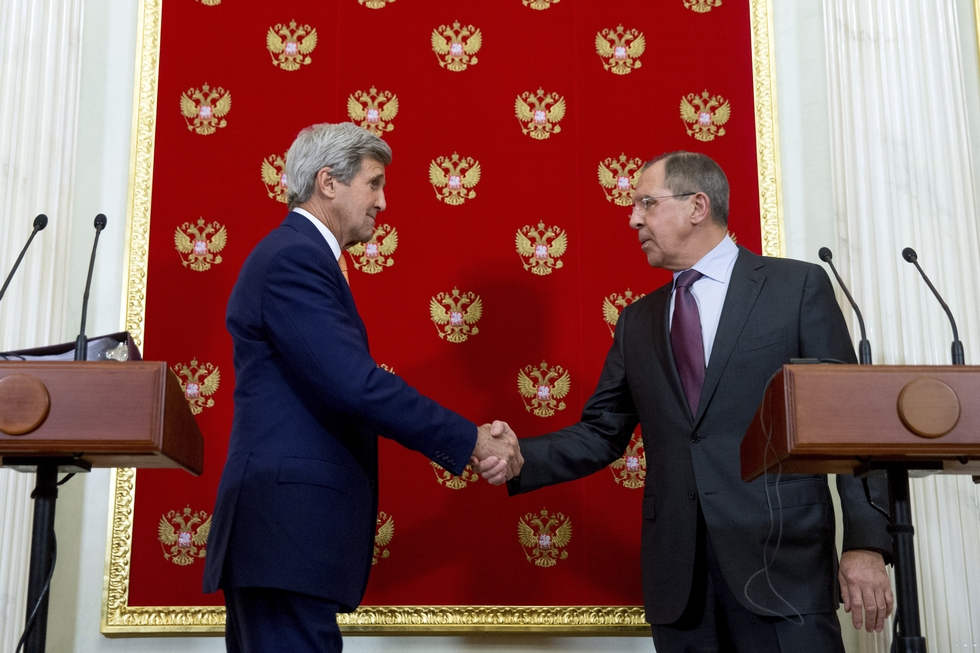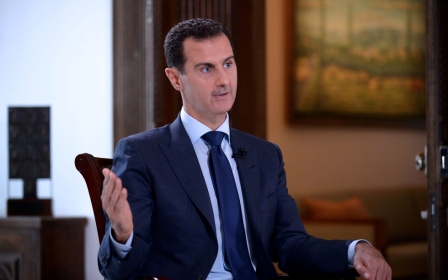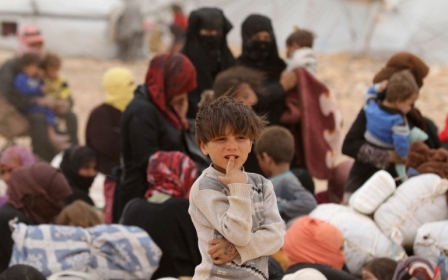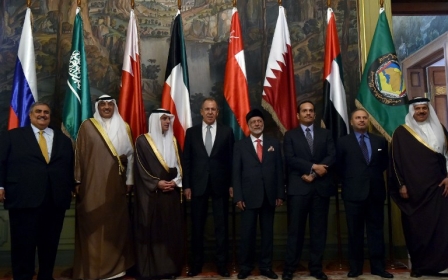US offering Russia pact to fight IS and Nusra in Syria

Top US envoy John Kerry met Russia's President Vladimir Putin late on Thursday to offer him closer military cooperation in the hope of salvaging the stalled Syria peace process.
The key to the meeting, as revealed in a leaked document, is an offer for the US military to work with Russia against al-Nusra Front and the Islamic State (IS) group.
In exchange, Russia would have to convince or strongarm its ally Bashar al-Assad into grounding his own planes and halting attacks on civilians and moderate opposition groups.
There was no news conference as the meeting ended at 1am (2200 GMT) Friday after three hours of closed-door talks and, before they met, the two men had given little away.
"I would like to note our mutual effort in the settlement of conflicts that we deem important to resolve," Putin said, conveying his regards to President Barack Obama.
"My last conversation with President Obama has convinced me that we are indeed striving not only to establish a process of cooperation but also to achieve important results."
Sitting across from him, Kerry, agreed that Obama had found the recent telephone call "constructive".
"Hopefully we'll be able to make some genuine progress that is measurable and implementable and that can make a difference in the course of events in Syria," he said. Currently, Russian forces in Syria are operating in support of Assad's government against a variety of rebel factions, while a US-led coalition focuses its fire on IS.
Any deal between the great power rivals would be controversial, since for many - including critics of Obama in Washington - it would amount to a tacit acceptance of Putin's efforts to shore up Assad and his attacks on opposition forces that include US-backed groups.
In the last 48 hours, Russia has stepped up bombing in Palmyra, launching more than 50 air strikes against IS in the last 48 hours, the defence ministry in Moscow said on Thursday.
Syrian government forces re-took the ancient town with intense Russian aerial backing back in March but IS has proven harder to dislodge from the surrounding countryside. The statement added that strikes were also launched against IS in the Homs region.
However, on Thursday air strikes killed at least 12 civilians including children in two rebel-held neighbourhoods of Syria's Aleppo, a monitoring group said. The Syrian Observatory for Human Rights, a UK-based group, said it was unclear whether the strikes were carried out by warplanes of the Syrian government or its ally Russia.
Pro-government forces, with Russian help, have in recent days cut off the last remaining rebel-held road into Aleppo, leading to widespread fears that the rebel-held parts of the city, which are not held by IS, will be besieged and heavily bombed.
Later on Friday, after a night at a Moscow hotel, Kerry was to hold more detailed talks with his immediate counterpart Foreign Minister Sergei Lavrov.
But the diplomatic words could not conceal US concern and Washington said two major issues to be addressed were Assad's ceasefire violations and al-Nusra's growing role.
"We need a solution to this that addresses both of these problems," a senior US official said.
"If we cannot get to a solution that resolves both of those problems we're going to be in a very different place, and the reality is that time is short here," he warned.
Fresh UN peace talks
The UN’s main Syria mediator Staffan de Mistura on Thursday called on Moscow and Washington to push for a resumption of Syrian peace talks, which he hoped could resume next month. They were originally intended to start in July.
De Mistura told reporters in Geneva he wanted to "ensure that we have enough, sufficient, critical mass in order to give a sufficient chance for a concrete and effective beginning of the third round of the intra-Syrian talks".
The talks "have a target date of August," de Mistura said.
"These talks ... are meant to be a credible beginning of a roadmap towards a political transition, so they need to be well-prepared," he said.
Washington and Moscow have backed a roadmap that calls for a nationwide ceasefire and Geneva-based talks on "political transition,” he added.
However the Syrian president said in an interview released on Thursday that his Russian ally has "never" discussed a political transition with him, despite international support for such a process.
Russia 'never discussed' transition
Speaking to NBC News in Damascus, the embattled leader insisted the Russian president and foreign minister had never raised the issue of his departure or a political transition with him.
"Only the Syrian people define who's going to be the president, when to come, and when to go," Assad told NBC. "They [Russia] never said a single word regarding this," he said.
A partial ceasefire agreed back in February - which excluded IS and Nusra - did briefly stem the fighting in some parts of Syria, although the guns never fell silent in strategically key Aleppo or neighbouring Idlib.
De Mistura said he hoped Washington and Moscow could now work to reduce the "non-constructive ambiguity" surrounding al-Nusra, saying this "has been one of the main problems for the sustainability of the cessation of hostilities."
While IS's so-called "caliphate" has global ambitions, al-Nusra has concentrated on battling Assad, fighting alongside other rebel groups backed by US allies.
Any deal between Russia and the United States to fight both groups would in effect strengthen Assad's position, and could undermine US efforts to press him to agree a negotiated political settlement to the civil war.
Assad’s future has also been a key sticking point in negotiations with the opposition insisting that he go and the government insisting that he stay. Analysts have tended to disagree about whether Assad’s key backers in Moscow and Tehran would be willing to hammer out a deal that would see him replaced with another friendly candidate.
This article is available in French on Middle East Eye French edition.
New MEE newsletter: Jerusalem Dispatch
Sign up to get the latest insights and analysis on Israel-Palestine, alongside Turkey Unpacked and other MEE newsletters
Middle East Eye delivers independent and unrivalled coverage and analysis of the Middle East, North Africa and beyond. To learn more about republishing this content and the associated fees, please fill out this form. More about MEE can be found here.




